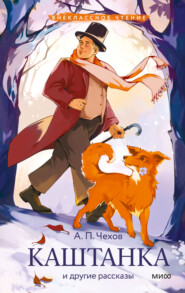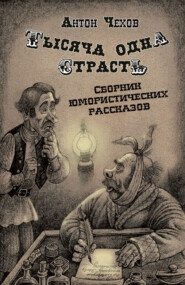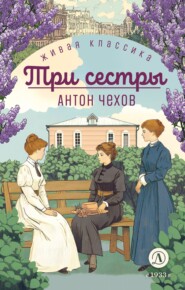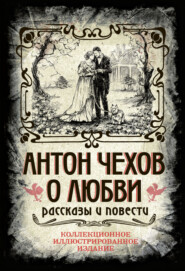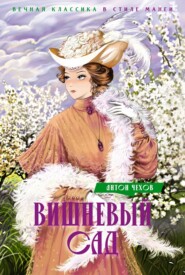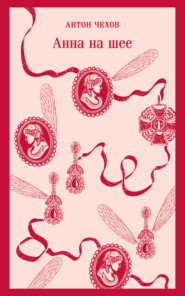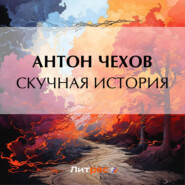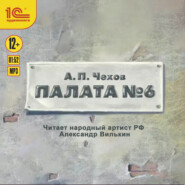По всем вопросам обращайтесь на: info@litportal.ru
(©) 2003-2025.
✖
The Bishop and Other Stories
Настройки чтения
Размер шрифта
Высота строк
Поля
"Ivan Ivanitch! Father Christopher! Do be so good as to take a cup of tea with me. Surely I am not such a bad man that you can't even drink tea in my house? Ivan Ivanitch!"
"Well, we may just as well have a cup of tea," said Father Christopher, with a sympathetic smile; "that won't keep us long."
"Very well," Kuzmitchov assented.
Moisey Moisevitch, in a fluster uttered an exclamation of joy, and shrugging as though he had just stepped out of cold weather into warm, ran to the door and cried in the same frantic voice in which he had called Solomon:
"Rosa! Rosa! Bring the samovar!"
A minute later the door opened, and Solomon came into the room carrying a large tray in his hands. Setting the tray on the table, he looked away sarcastically with the same queer smile as before. Now, by the light of the lamp, it was possible to see his smile distinctly; it was very complex, and expressed a variety of emotions, but the predominant element in it was undisguised contempt. He seemed to be thinking of something ludicrous and silly, to be feeling contempt and dislike, to be pleased at something and waiting for the favourable moment to turn something into ridicule and to burst into laughter. His long nose, his thick lips, and his sly prominent eyes seemed tense with the desire to laugh. Looking at his face, Kuzmitchov smiled ironically and asked:
"Solomon, why did you not come to our fair at N. this summer, and act some Jewish scenes?"
Two years before, as Yegorushka remembered very well, at one of the booths at the fair at N., Solomon had performed some scenes of Jewish life, and his acting had been a great success. The allusion to this made no impression whatever upon Solomon. Making no answer, he went out and returned a little later with the samovar.
When he had done what he had to do at the table he moved a little aside, and, folding his arms over his chest and thrusting out one leg, fixed his sarcastic eyes on Father Christopher. There was something defiant, haughty, and contemptuous in his attitude, and at the same time it was comic and pitiful in the extreme, because the more impressive his attitude the more vividly it showed up his short trousers, his bobtail coat, his caricature of a nose, and his bird-like plucked-looking little figure.
Moisey Moisevitch brought a footstool from the other room and sat down a little way from the table.
"I wish you a good appetite! Tea and sugar!" he began, trying to entertain his visitors. "I hope you will enjoy it. Such rare guests, such rare ones; it is years since I last saw Father Christopher. And will no one tell me who is this nice little gentleman?" he asked, looking tenderly at Yegorushka.
"He is the son of my sister, Olga Ivanovna," answered Kuzmitchov.
"And where is he going?"
"To school. We are taking him to a high school."
In his politeness, Moisey Moisevitch put on a look of wonder and wagged his head expressively.
"Ah, that is a fine thing," he said, shaking his finger at the samovar. "That's a fine thing. You will come back from the high school such a gentleman that we shall all take off our hats to you. You will be wealthy and wise and so grand that your mamma will be delighted. Oh, that's a fine thing!"
He paused a little, stroked his knees, and began again in a jocose and deferential tone.
"You must excuse me, Father Christopher, but I am thinking of writing to the bishop to tell him you are robbing the merchants of their living. I shall take a sheet of stamped paper and write that I suppose Father Christopher is short of pence, as he has taken up with trade and begun selling wool."
"H'm, yes.. it's a queer notion in my old age," said Father Christopher, and he laughed. "I have turned from priest to merchant, brother. I ought to be at home now saying my prayers, instead of galloping about the country like a Pharaoh in his chariot… Vanity!"
"But it will mean a lot of pence!"
"Oh, I dare say! More kicks than halfpence, and serve me right. The wool's not mine, but my son-in-law Mikhail's!"
"Why doesn't he go himself?"
"Why, because.. His mother's milk is scarcely dry upon his lips. He can buy wool all right, but when it comes to selling, he has no sense; he is young yet. He has wasted all his money; he wanted to grow rich and cut a dash, but he tried here and there, and no one would give him his price. And so the lad went on like that for a year, and then he came to me and said, 'Daddy, you sell the wool for me; be kind and do it! I am no good at the business!' And that is true enough. As soon as there is anything wrong then it's 'Daddy,' but till then they could get on without their dad. When he was buying he did not consult me, but now when he is in difficulties it's Daddy's turn. And what does his dad know about it? If it were not for Ivan Ivanitch, his dad could do nothing. I have a lot of worry with them."
"Yes; one has a lot of worry with one's children, I can tell you that," sighed Moisey Moisevitch. "I have six of my own. One needs schooling, another needs doctoring, and a third needs nursing, and when they grow up they are more trouble still. It is not only nowadays, it was the same in Holy Scripture. When Jacob had little children he wept, and when they grew up he wept still more bitterly."
"H'm, yes." Father Christopher assented pensively, looking at his glass. "I have no cause myself to rail against the Lord. I have lived to the end of my days as any man might be thankful to live… I have married my daughters to good men, my sons I have set up in life, and now I am free; I have done my work and can go where I like. I live in peace with my wife. I eat and drink and sleep and rejoice in my grandchildren, and say my prayers and want nothing more. I live on the fat of the land, and don't need to curry favour with anyone. I have never had any trouble from childhood, and now suppose the Tsar were to ask me, 'What do you need? What would you like?' why, I don't need anything. I have everything I want and everything to be thankful for. In the whole town there is no happier man than I am. My only trouble is I have so many sins, but there – only God is without sin. That's right, isn't it?"
"No doubt it is."
"I have no teeth, of course; my poor old back aches; there is one thing and another… asthma and that sort of thing… I ache… The flesh is weak, but then think of my age! I am in the eighties! One can't go on for ever; one mustn't outstay one's welcome."
Father Christopher suddenly thought of something, spluttered into his glass and choked with laughter. Moisey Moisevitch laughed, too, from politeness, and he, too, cleared his throat.
"So funny!" said Father Christopher, and he waved his hand. "My eldest son Gavrila came to pay me a visit. He is in the medical line, and is a district doctor in the province of Tchernigov… 'Very well.' I said to him, 'here I have asthma and one thing and another… You are a doctor; cure your father!' He undressed me on the spot, tapped me, listened, and all sorts of tricks… kneaded my stomach, and then he said, 'Dad, you ought to be treated with compressed air.'" Father Christopher laughed convulsively, till the tears came into his eyes, and got up.
"And I said to him, 'God bless your compressed air!'" he brought out through his laughter, waving both hands. "God bless your compressed air!"
Moisey Moisevitch got up, too, and with his hands on his stomach, went off into shrill laughter like the yap of a lap-dog.
"God bless the compressed air!" repeated Father Christopher, laughing.
Moisey Moisevitch laughed two notes higher and so violently that he could hardly stand on his feet.
"Oh dear!" he moaned through his laughter. "Let me get my breath
… You'll be the death of me."
He laughed and talked, though at the same time he was casting timorous and suspicious looks at Solomon. The latter was standing in the same attitude and still smiling. To judge from his eyes and his smile, his contempt and hatred were genuine, but that was so out of keeping with his plucked-looking figure that it seemed to Yegorushka as though he were putting on his defiant attitude and biting sarcastic smile to play the fool for the entertainment of their honoured guests.
After drinking six glasses of tea in silence, Kuzmitchov cleared a space before him on the table, took his bag, the one which he kept under his head when he slept under the chaise, untied the string and shook it. Rolls of paper notes were scattered out of the bag on the table.
"While we have the time, Father Christopher, let us reckon up," said Kuzmitchov.
Moisey Moisevitch was embarrassed at the sight of the money. He got up, and, as a man of delicate feeling unwilling to pry into other people's secrets, he went out of the room on tiptoe, swaying his arms. Solomon remained where he was.
"How many are there in the rolls of roubles?" Father Christopher began.
"The rouble notes are done up in fifties… the three-rouble notes in nineties, the twenty-five and hundred roubles in thousands. You count out seven thousand eight hundred for Varlamov, and I will count out for Gusevitch. And mind you don't make a mistake.."
Yegorushka had never in his life seen so much money as was lying on the table before him. There must have been a great deal of money, for the roll of seven thousand eight hundred, which Father Christopher put aside for Varlamov, seemed very small compared with the whole heap. At any other time such a mass of money would have impressed Yegorushka, and would have moved him to reflect how many cracknels, buns and poppy-cakes could be bought for that money. Now he looked at it listlessly, only conscious of the disgusting smell of kerosene and rotten apples that came from the heap of notes. He was exhausted by the jolting ride in the chaise, tired out and sleepy. His head was heavy, his eyes would hardly keep open and his thoughts were tangled like threads. If it had been possible he would have been relieved to lay his head on the table, so as not to see the lamp and the fingers moving over the heaps of notes, and to have let his tired sleepy thoughts go still more at random. When he tried to keep awake, the light of the lamp, the cups and the fingers grew double, the samovar heaved and the smell of rotten apples seemed even more acrid and disgusting.
"Ah, money, money!" sighed Father Christopher, smiling. "You bring trouble! Now I expect my Mihailo is asleep and dreaming that I am going to bring him a heap of money like this."
"Your Mihailo Timofevitch is a man who doesn't understand business," said Kuzmitchov in an undertone; "he undertakes what isn't his work, but you understand and can judge. You had better hand over your wool to me, as I have said already, and I would give you half a rouble above my own price – yes, I would, simply out of regard for you.."
"No, Ivan Ivanitch." Father Christopher sighed. "I thank you for your kindness… Of course, if it were for me to decide, I shouldn't think twice about it; but as it is, the wool is not mine, as you know.."
Moisey Moisevitch came in on tiptoe. Trying from delicacy not to look at the heaps of money, he stole up to Yegorushka and pulled at his shirt from behind.
"Come along, little gentleman," he said in an undertone, "come and see the little bear I can show you! Such a queer, cross little bear. Oo-oo!"
The sleepy boy got up and listlessly dragged himself after Moisey Moisevitch to see the bear. He went into a little room, where, before he saw anything, he felt he could not breathe from the smell of something sour and decaying, which was much stronger here than in the big room and probably spread from this room all over the house. One part of the room was occupied by a big bed, covered with a greasy quilt and another by a chest of drawers and heaps of rags of all kinds from a woman's stiff petticoat to children's little breeches and braces. A tallow candle stood on the chest of drawers.
Instead of the promised bear, Yegorushka saw a big fat Jewess with her hair hanging loose, in a red flannel skirt with black sprigs on it; she turned with difficulty in the narrow space between the bed and the chest of drawers and uttered drawn-out moaning as though she had toothache. On seeing Yegorushka, she made a doleful, woe-begone face, heaved a long drawn-out sigh, and before he had time to look round, put to his lips a slice of bread smeared with honey.
"Eat it, dearie, eat it!" she said. "You are here without your mamma, and no one to look after you. Eat it up."






